




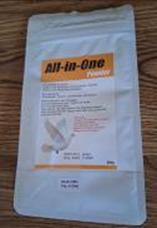
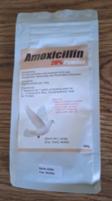
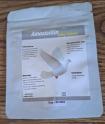
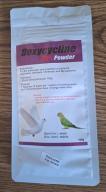
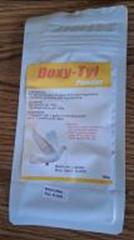
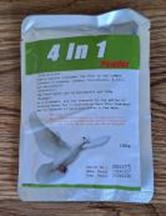
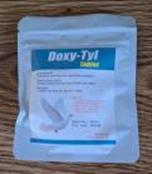
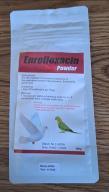
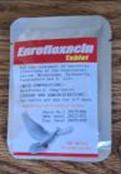
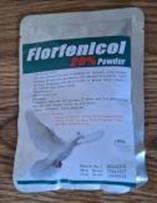

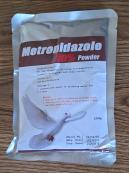
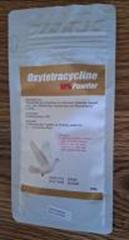
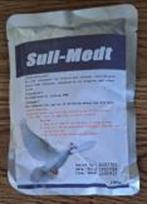
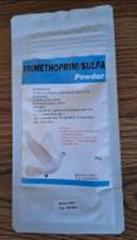
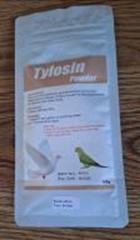


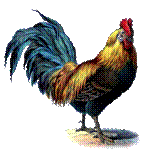
|
Poultry & Game Bird Medications |
|
|
The Veterinary Feed Directive, which became effective 1/1/17, included a ban on water soluble antibiotics which can be sold over the counter. Go to the Days of OTC Antibiotics Are Numbered to read more. These are the only medications not affected by the ban which can be sold without a prescription from a veterinarian. Go to the Diagnostic Chart for Bird Diseases for help in determining which medication to purchase to treat your birds |
|
|
BMD (Solu-Tracin) - 4.1 oz pkg. makes 50 gallons. Treats quail enteritis, mud fever & other diseases characterized by diarrhea. Contains Bacitracin/MD. For prevention: mix ⅛ tsp. to 1 gal. of water; for treatment mix ½ tsp. per gal. of water. |
$29.00
|
|
Corid 20% Soluble Powder 10 oz. package Used to treat coccidiosis in growing chickens, turkeys, & laying hens. Mix 1 1/2 teaspoons Corid daily with 1 gallon fresh drinking water for 5 consecutive days as a treatment. When using as a treatment, provide to all birds in the flock at the signs of coccidiosis. |
$25.00 |
|
Vet-RX 2 oz bottle Used to treat respiratory problems; conditions combs & legs of show poultry. Use full strength 1/4 tsp. per 1/2 cup of water to treat respiratory. |
$11.00 |
|
Medications Labeled for Pigeons |
|
|
Most manufacturers of medications do not print the withdrawal periods fo eggs produced for human consumption and for slaughter. If you are using medications in birds which are used for producing eggs for human consumption or for meat, Google the withdrawal periods for that particular drug on a reliable veterinary site. The withdrawal period is figured from the last day of usage. Ie. If you finished using a medication on the 10th day of the month and the withdrawal period is 14 days, then it would safe to start eating the eggs of the 24th day of the month. According to what I found on the internet, the minimal withdrawal period for slaughter is 28 days and for eggs is 7 days. Research shows that for some drugs 10 to 14 days is not enough. For example, the withdrawal period for Tylosin pwd for eggs used for human consumption is 2 to 4 weeks and 0 days for slaughter. There is a 7-day withdrawal period for slaughter for Doxycline, but is not approved for usage in hens laying eggs used for human consumption. |
|
|
1 Eye 1 Drop 1 Time 1 fluid oz. dropper bottle contains about 900 drops to treat one eye colds. |
$25.00 |
|
4 in 1 20% Powder - 100 gr. Package Treats Canker, E-Coli, Paratyphoid, & Coccidiosis. 1 teaspoon per gallon of water for 7 days. Makes 28 to 30 gallons. |
$25.00 |
|
All-in-One 200 gram package All-in–One is a good medication for bird breeders who have small flocks. Instead of purchasing 5 different packages of products to treat the birds, purchase just this one medication. It contains Amprolium for the prevention and treatment of Coccidiosis. It also contains Ronidazole, an effective drug for the treatment of Canker (Trichomoniasis). All-In-One contains Levamisol which treats worms with the exception of Tape Worms. The medication contains Tylan to treat respiratory diseases. The fifth ingredient is a probiotics to rebuild gut bacteria, and to relieve stress. Dosage: 2 tsps. per gal for 5 days. Makes 28-30 gallons. |
$46.00
|
|
Amoxicillin 20% Powder 100 gr. Package Treats Canker, Paratyphoid, Salmonella, and respiratory problems. 1 teaspoon per gallon of water for 3-7 consecutive days. Treat Paratyphoid for 14 consecutive days. |
$25.00 |
|
Amoxicillin Tablets 100 10mg. Tablets for the individual treatment of respiratory problems, paratyphoid, and e-coli. 1 tablet daily for 7 days. Paratyphoid 1 tablet daily for 23 days. |
$24.00 |
|
Doxycycline 20% Powder - 100 grams pkg. Treats ornithosis, paratyphoid, mycroplasmsis, chalamydia, & respiratory in pigeons and cage birds. Use 1 teaspoon per gallon of water for 7 to 10 days. |
$25.00
|
|
Doxy-Tyl - 100 gram pkg. Contains 10 grams Doxycycline & 40 grams Tylosin for the treatment of respiratory infections, ornithosis, & mycoplasma. Use 1 teaspoon per gallon of water for 5 to 7 consecutive days. |
$33.00 |
|
Doxy-Tyl Tablets 100 tablets (20 mg doxycyclin and 5 mg Tylosin) for the individual treatment of respiratory problems. 1 tablet daily for 7 days. |
$25.00 |
|
Enrofloxacin 20% Powder (Baytril) 100 grams Treats bacterial infections of the respiratory system, salmonella, mycroplasmsis, & E. Coli. 1 teaspoon per gallon of water for 4 to 6 consecutive days. Change water daily. |
$26.00
|
|
Enrofloxacin Tablets (Baytril) 100 count 10 mg/tablet. Treats bacterial respiratory infections, salmonella, paratyphoid, mycroplasma, & E. Coli. 1 tablet per day for 3 to 7 days. |
$25.00 |
|
Erythomycin Tablets 100 count 10 mg./tablet. Treats chronic respiratory diseases. Treats CRD, Infectious Coryza, & Bluecomb (non-specific infectious enteritis). Don’t use on poultry producing eggs for human consumption. Use 1 tablet daily for 1 to 12 days. |
$28.00 |
|
Florfenicol 20% Powder 100 gram package. For the prevention and treatment of chronic respiratory disease. Bronchitis, pneumonia, air sac disease, & E. Coli, serious diarrhea, yellowish-brown or loose green stools in pigeons and other birds. Use 1 tsp. per 2 gallons water for 3-5 consecutive days. |
$26.00 |
|
Linco-Spect 50 Powder 100 gram package for the treatment of Air sacculitis caused by either Mycoplasma synoviae or M. gallisepticum, CRD, and complicated CRD caused by Escherichia coli and M. gallisepticum. Dosage: 1 teaspoon per 2.5 gallons drinking water for 5-7 consecutive days. |
$35.00 |
|
Metronidazole 20% Powder 250 gram package For the treatment of avian trichomoniasis (canker) in pigeons & blackhead in other birds. Use 1 teaspoon per quart of water for 5 to 7 days. 250 gram package makes this the best buy in canker medications!! |
$27.00 |
|
Oxytetracycline 10% Powder 100 gram package (same active ingredient as Terramycin Powder which is no longer manufactured.) For control and treatment of infectious diseases caused by E-coli, Samonella, Pasteurella & Mycroplasma in birds. 1 tsp. per gallon of water for 5 to 7 days. |
$26.00 |
|
Sull-Medt - 100 gram pkg. contains 99% Sulfamethazine sodium for the treatment of coryza, coccidiosis, acute fowl cholera, & salmonella in pigeons and other birds. Use 1 teaspoon per gallon of drinking water for 3 to 5 days. |
$25.00
|
|
Trimethoprim/Sulfa Powder 100 gram pkg. For the treatment of Paratyphoid, E-Coli, Coccidiosis. Use 1 tsp. per gallon of water for 5 days.
|
$26.00 |
|
Tylosin Powder - 100 gram pkg. Use as an aid to prevent Chronic Respiratory Disease (CRD), Mycroplasma gallisepticum, Mycroplasma synoviae, and Necrotic Enteritis. Use 1 teaspoon per gallon of drinking water for 7 consecutive days. To insure proper mixing, add the water to the powder. Prepare fresh Tylosin solution every 3 days. Contains 99% Tylosin tartrate. |
$37.00 |
|
Chicken Health Handbook by Gail Damerow 496 p, pb One-of-a-kind reference book covers the health problems that plague chickens of all breeds and ages. Practical charts identify common symptoms and causes of infection, while an alphabetic listing of diseases provides advice on treatment. You’ll find helpful descriptions of troublesome ailments of all types, from poor egg production to crooked toe syndrome. Practical remedies and gentle preventative care measures will help your beloved flock stay happy, healthy, and safe. |
$19.00 |